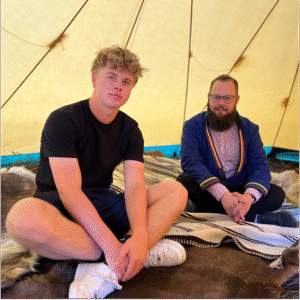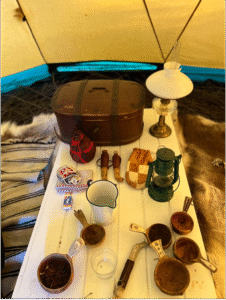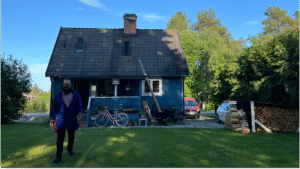18-year-old Elias Malmqvist interviewed a Sámi activist who preserves his culture through joiking

Elias with Juhán Niila Stålka in the lavvu, a traditional Sámi tent.
Picture by: OXSFJ
Article link copied.
August 1, 2025
Seeing and hearing the Sámi through Juhán’s eyes and voice

I entered the lavvu, the traditional Sámi tent, and was greeted by Juhán Niila Stålka. He was sitting on the left side of the kitchen – traditionally the place where the husband would sit, while the wife would sit opposite. I sat further down, in the area reserved for guests.
The tent had a central pole for extra support, standing between the firepit and a small wooden table topped with a wooden box and some bowls. The floor was made of twigs covered with reindeer pelts and rugs, which we sat on.
Harbingers’ Weekly Brief
I had joined this gathering as part of a storytelling and joiking event that Juhán was hosting. It was a hot summer’s day, and the tent’s purpose – to keep warmth inside during the cold winter – meant the heat was palpable. Sitting inside, I felt like I had stepped into history, into a space where Juhán’s ancestors had once gathered.
Juhán began grinding coffee beans to brew in the traditional way, placing the pot over the fire he’d just lit. He also passed around thin slices of dried reindeer meat – a customary Sámi offering – to me and the other guests, and began to introduce himself and talk about his family.
Then, almost without warning, he began joiking – the traditional form of Sámi song, used to express people, animals or landscapes. I had never heard of joiking before. It was unexpected and unlike anything I’d ever experienced.
‘I grew up with joik’
Juhán Niila Stålka is a 27-year-old Sámi man who lives in Jokkmokk, a municipality in northern Sweden where 50% of residents have Sámi heritage. It’s known as the ‘Mecca’ of the Sámi people.

Traditional coffee-making equipment in the tent.
Picture by: OXSFJ
A passionate advocate for Sámi rights, Juhán has strong views and hopes for his community’s future. “I think you need to have respect and understanding for different ways of working within the Sámi community,” he said.
Juhán told me that if a Sámi person grows up in a reindeer-herding family – the main traditional livelihood of the Sámi people – then reindeer herding is essential to their being.
“Some say reindeer herding is at the centre of Sámi culture. I wouldn’t agree with that – I’m not a reindeer herder, so I won’t have that perspective. But there are certainly a lot of Sámi people who do,” he said.
He explained that taking away someone’s ability to herd reindeer means stripping them of their main connection and contribution to the Sámi community.
From listening to Juhán speak, it was clear that joiking was not just a cultural tradition – it was part of his identity.
Whenever he talked about joiking or began to joik, his eyes lit up with passion and pride, and a deep commitment to honouring and representing his people. He explained: “You don’t joik about something, but you joik something.”
“I grew up with joik. I learned it from my dad and he from his dad. I can’t imagine someone taking away my ability to joik,” he told me after the storytelling event.
Misconceptions and discrimination
Outsiders are unaware of the scope of Sámi history and reach, and often minimise or misunderstand their significance. The Sámi people live not only in northern Sweden, but also in areas of Norway, Finland and Russia; population data is unreliable, but it is estimated there are between 50,000 and 100,000 Sámi.
One problem that Juhán faces is the persistence of harmful misconceptions. “The view people have of the Sámi when they come here is that we’ve been living isolated,” he told me. “But we have been trading people. We’ve been communicating all over the world. That is one misconception I often encounter.”
Discrimination remains a massive issue. Juhán explained that ‘Lapp’ or ‘Laplander’ – the term historically used to refer to Sámi people – is derogatory. “The first time I got called it was in Kiruna. I was 14, walking down the street wearing my hat, and people yelled it at me. I didn’t do anything – I was just a kid,” he said.
This kind of discrimination can lead Sámi people to hide their identity. “I’ve found myself in conversations where I choose my words carefully,” Juhán said. “Because if I say I’m Sámi, it could become an argument where I have to defend my entire people. And sometimes you just don’t have the energy for that.”
The discrimination, he added, extends to schools, where bullying and exclusion are still common experiences for Sámi youth.
Another major issue is land rights. There is a long-standing conflict between the Swedish government and the Sámi people over who has the authority to manage and make decisions about traditional Sámi territories.
But Juhán believes there are concrete ways to move forward and that ‘FPIC’ – free, prior, and informed consent – is the solution.
“If they’re using the land, the Sámi people should be free to choose, and that choice should come before anything happens. It should be consent, it should be informed and you should know the consequences. I think this is a super good way to work. If the Swedish government applies this principle in Sápmi, they’ll go a long way in building good relationships with the Sámi people,” he explained.

Juhán Niila Stålka outside his house in Jokkmokk.
Picture by: OXSFJ
Pride for Sámi heritage
Spending time with Juhán and writing this article has only deepened my respect and appreciation for Sámi culture. Often, we do not realise how many Indigenous peoples around the world are still facing unnecessary struggles – simply for honouring their culture and traditions.
I am eternally grateful to have met Juhán and to hear not just his words and joiks, but to witness the pride he carries for his Sámi heritage – all beginning in the warmth of the lavvu, where our conversation first started.
Written by:

Writer
Bali, Indonesia
Born in 2007 in Malmo, Elias has studied in Sweden, Chile, California, North Carolina, and Bali. He is interested in business, entrepreneurship, management and international relations and plans to study along those lines. For Harbingers’ Magazine, he writes about economics, society, international relations, and sports.
In his free time, Elias plays football, does Maui Thai, goes to the gym, enjoys riding motorbikes and spending quality time with friends and family. He has played high level football his entire life and runs a microbusiness teaching football to young athletes.
Elias speaks English and Swedish.
🌍 Join the World's Youngest Newsroom—Create a Free Account
Sign up to save your favourite articles, get personalised recommendations, and stay informed about stories that Gen Z worldwide actually care about. Plus, subscribe to our newsletter for the latest stories delivered straight to your inbox. 📲
© 2025 The Oxford School for the Future of Journalism


